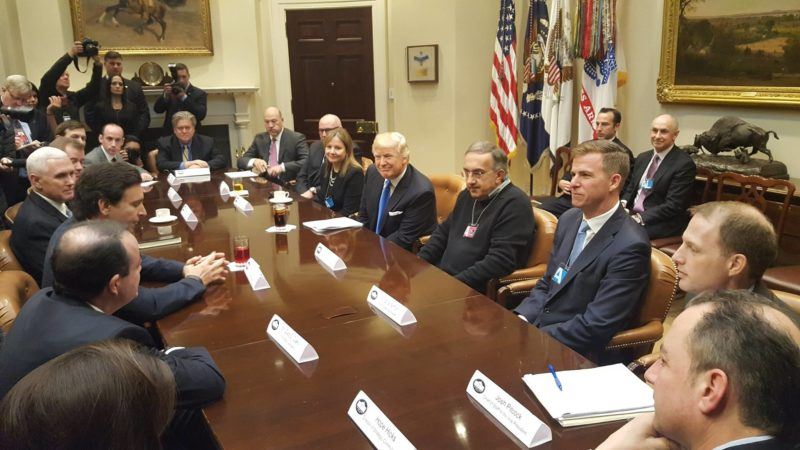
by Anonymous Student
This much is clear: Donald Trump doesn’t like being criticized. It’s understandable – of course nobody wants to hear that they’re doing a bad job – but the effort that he’s going through to silence criticism represents a callous disregard for some of the most basic protections of our constitution, and reaffirms the need for rational, civil discourse on an individual level as part of the political process.
In recent news, the president’s fight against dissenting viewpoints has put him at odds with the Constitution’s very first amendment. He’s banned several reputable news agencies, including CNN, BBC, and the New York Times, from his press conferences, after referring to several of these agencies as the literal “enemy of the people” (not to mention his classic “fake news” dismissal). He’s stated that he wants to “open up libel laws” to enable him to more easily sue news agencies. He’s suggested jail time or loss of citizenship for burning the flag, which although highly controversial has been established as protected speech twice by the Supreme Court, including avowed conservative justice Antonin Scalia. And (although not actually unconstitutional) he’s ordered the censorship of government websites, in this case the EPA’s discussion of climate change.
There’s a good reason the 1st amendment is at the top of the Bill of Rights. The nation’s founders deemed the freedoms of religion, speech, the press, peaceful assembly, and petitioning the government to be the most essential to our country’s operation. Among other things, the rights to free speech and a free press serve to hold the government accountable – officials are more responsible for their actions when public opinion is unrestricted, and outside media sources can draw their own conclusions and report accordingly. For elected officials, being subject to criticism is simply part of the job description – a fact that Trump should be very familiar with after spending years on the other side of the situation, engaging in regular vilification of then-President Obama on Twitter. But Trump’s fight against free expression seems to be part of a campaign to paint him as an infallible leader whose views go unopposed and unchallenged, going so far as to call the voting results themselves into question in an attempt to give the appearance of greater support. Is this for political or purely egotistical purposes? Possibly both…
At this point, you might be wondering: what can your average person do about this? Fortunately, the answer again is in the 1st amendment: free discussion of ideas, in theory, should allow the people themselves to bypass any restrictions attempted by the government. The key words here being “in theory” – this is giving the people an awful lot of credit, as history shows that partisanship on either side can plant itself firmly in the way of any attempts at civil discussion. During the past election alone, Democrats and Republicans alike succumbed to some of the very faults Trump has been exhibiting.
Clinton supporters were quick to take the moral high ground, emboldened by comments the candidate made referring to Trump supporters as “the basket of deplorables”. Too often, Clinton supporters automatically assumed the worst from Trump supporters, reducing their viewpoints to simple racism, sexism, or other strawmen. Then, having made these judgements about their character, sometimes quite verbally, they subsequently relieved themselves of the responsibility of having to listen to their arguments at all.
Trump supporters, on the other hand, often fell victim to the cult of personality that he has continued to perpetuate into his presidency. During the campaign, he painted himself as the “anti-establishment” candidate, saying that he alone could fight Washington’s political elite – a narrative which allowed him to neatly place all of his opponents into the convenient, negatively-connoted “mainstream” or “establishment” box. And once again, this served as a method for his supporters to jump to conclusions and systematically ignore anything coming from this untrustworthy box of corruption.
Now it might be easy for me to look down from the hindquarters of my high horse and make these blanket judgements – but hindsight is in fact essential to examining these situations. And in hindsight, it’s clear that Trump and Clinton supporters alike, at times, weren’t exactly discussing issues with the facts as priority. What good are free speech and the free press if people aren’t going to use them to their maximum potential? If Trump supporters were more willing to consider sources from all angles, gaining a wider perspective on the issues, then perhaps they could have taken more notice of some of their candidate’s glaring flaws before the 9th of November. And if Clinton supporters had spent more time discussing these issues rather than resorting to character attacks, then perhaps they could have gotten some of those Trump supporters to actually listen.
Rational political discourse relies on several traits: the willingness to consider the facts objectively, a desire to discuss the issues rather than mere appearances, and most importantly, the ability to accept criticism and take into account other points of view. If (and that’s a very strong “if”) we as a nation can somehow manage to achieve these traits more than our current president, then we would already be on our way to improving as a nation.
